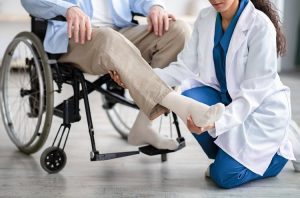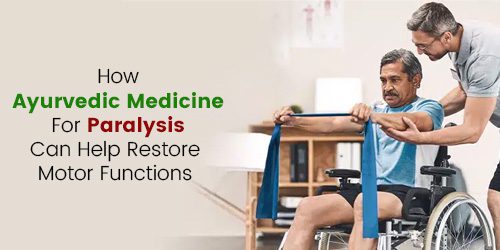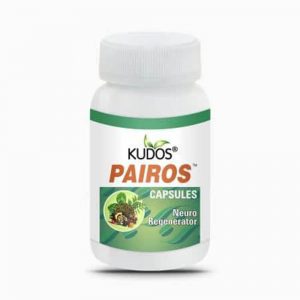How Ayurvedic Medicine for Paralysis Can Help Restore Motor Functions
The impairment of motor functions caused by paralysis can have a significant effect on a person’s life. The repercussions of paralysis can be physically, emotionally, and socially burdensome, ranging from restricted mobility to difficulties doing daily duties. Growing interest in Ayurvedic medicine, a natural and holistic method that offers hope for recovering motor capabilities, has emerged in the search for efficient treatment choices.
The ancient Indian science of Ayurveda sees paralysis as a discord between the body’s doshas and energies. The three doshas—Vata, Pitta, and Kapha—are said to control several bodily processes, including movement. These dosha imbalances can cause reduced motor skills and the beginning of paralysis. The goal of Ayurveda is to bring balance and harmony back to the body, which will aid in healing and recovery.
Ayurvedic therapy takes a thorough approach to treating paralysis, addressing not only the physical components of the ailment but also its mental and energy imbalances. It supports the body’s natural healing processes and promotes the regeneration of damaged tissues by combining herbal treatments, therapeutic techniques, and lifestyle changes.
Ayurvedic medicine has a variety of advantages in the treatment of paralysis. Natural components with special properties to hydrate the neurological system, encourage nerve regeneration, and improve general wellbeing are used to create ayurvedic formulations. These herbs, including Ashwagandha, Brahmi, and Guggulu, combine their effects to give the body’s healing process all-encompassing support.
Paralysis and Motor Function Loss

A disorder known as paralysis is characterized by the loss of muscular control and function in specific body areas. Strokes, spinal cord injuries, severe brain traumas, nerve damage, and specific neurological illnesses are only a few of the possible causes. Partial paralysis (paresis) or complete paralysis (plegia), affecting particular muscles or entire limbs, can occur depending on the location and severity of the damage.
Loss of motor function is closely related to paralysis. The complex interplay between the brain, spinal cord, and peripheral nerves is essential for our ability to move. A disruption or damage to the communication line between these vital parts might result in paralysis and the consequent loss of motor function.
Regaining motor skills is difficult for paralyzed people for a variety of reasons. Loss of mobility affects everyday activities and mental wellbeing in addition to physical capacities. Simple activities like walking, gripping items, and keeping balance are frequently challenging for people with paralysis, which can have a considerable negative impact on their independence and quality of life.
Following paralysis, restoring motor skills can be difficult and requires extensive rehabilitation. Physical therapy, occupational therapy, and other specialist interventions are combined in this process. The underlying reason, the degree of the harm, the person’s general health, and their drive all have a role in how far they can recover.
Retraining the muscles, increasing strength, and facilitating useful motions are all important aspects of physical therapy. Restoration of daily function and the creation of coping mechanisms are the main goals of occupational therapy. These treatments aim to promote neuroplasticity, the brain’s capacity to reorganize and build new connections, which enables the body to pick up new movement patterns.
Ayurvedic Approach to Restoring Motor Functions
The traditional Indian medical system known as Ayurveda provides a comprehensive approach to health and wellbeing. It sees the human body as a dynamic synthesis of parts that are interrelated and necessary for preserving good health—physical, mental, and spiritual. Ayurveda offers helpful insights and all-natural cures in the context of regaining motor functioning in paralysis instances.
According to Ayurveda, the harmony of the body’s three doshas, or vital forces, Vata, Pitta, and Kapha, is essential for health. These doshas are said to be out of balance when paralysis occurs, especially the Vata dosha, which controls bodily movement and communication. The intrinsic healing capacities of the body can be stimulated, according to ayurvedic practitioners, which can improve motor functions.
In situations of paralysis, ayurvedic medicine offers a thorough and individualized approach to regaining motor functioning. It places a strong emphasis on using herbal preparations, natural medicines, and therapeutic techniques to treat the underlying causes of paralysis and advance general wellbeing.
Numerous herbs and organic substances with revitalizing, nerve-strengthening, and anti-inflammatory qualities are used in Ayurvedic therapy. These components—including Ashwagandha, Brahmi, Bala, and Guggulu—are chosen with care and blended to produce formulations that assist neuron regeneration, increase muscle strength, and boost motor function.
Ayurvedic therapies like Panchakarma can be helpful in situations of paralysis in addition to herbal cures. Panchakarma is a specialist detoxification and rejuvenation procedure that seeks to cleanse the body of built-up toxins and bring equilibrium back. These treatments aid in lowering inflammation, enhancing blood circulation, and encouraging the healing of injured tissues. They may include massage, herbal steam, and specialty oil treatments.
Ayurveda also stresses the need of dietary adjustments and lifestyle changes in regaining motor capabilities. It promotes a nutritious diet that is well-balanced and abundant in fresh fruits, vegetables, whole grains, and healthy fats. Depending on a person’s specific doshic constitution and underlying imbalances, different dietary suggestions could be made.
Benefits of Ayurvedic Medicine for Paralysis:
- Nerve Regeneration: Ayurvedic medicine employs herbs and ingredients that promote nerve regeneration. By providing essential nutrients and antioxidants, it supports the growth and repair of damaged nerves, potentially restoring motor functions over time.
- Improved Blood Circulation: Effective blood circulation is crucial for the delivery of oxygen and nutrients to affected areas of the body. Ayurvedic medicines, such as those containing Brahmi and Shilajit, enhance blood circulation, ensuring optimal nourishment to the nerves and muscles, aiding in the recovery process.
- Muscle Strength Enhancement: Paralysis often leads to muscle weakness and atrophy. Ayurvedic medicines, including Ashwagandha and Guggulu, help strengthen the muscles and enhance their functionality. These herbs provide nourishment to the muscular tissues, improve muscle tone, and support the rebuilding of damaged muscle fibers.
- Holistic Approach: Ayurveda takes a holistic approach to treatment, considering the individual as a whole rather than focusing solely on the symptoms. Ayurvedic remedies for paralysis aim to address the underlying causes, such as imbalances in the doshas (bioenergetic principles), lifestyle factors, and emotional well-being. This comprehensive approach supports overall healing and recovery.
Best Ayurvedic Medicine for Restoring Motor Functions
Ayurvedic medicine offers a range of effective remedies for restoring motor functions in paralysis. These natural formulations, derived from herbs and minerals, aim to support nerve regeneration, improve blood circulation, and enhance muscle strength. In this article, we will explore some of the best Ayurvedic medicines commonly used for restoring motor functions, including their key ingredients, benefits, recommended dosage, and important precautions to consider.
Mahayograj Guggulu:
- Ingredients: Mahayograj Guggulu is a potent Ayurvedic formulation comprising various herbs, including Guggulu (Commiphora mukul), Shunthi (Zingiber officinale), and Pippali (Piper longum), among others.
- Benefits: Mahayograj Guggulu is known for its anti-inflammatory and analgesic properties, making it beneficial for reducing pain and inflammation associated with paralysis. It supports joint health, muscle strength, and helps restore motor functions.
Rasraj Ras:
- Ingredients: Rasraj Ras is a classical Ayurvedic formulation composed of potent ingredients such as Swarna Bhasma (Gold Bhasma), Rajata Bhasma (Silver Bhasma), Abhraka Bhasma (Mica Bhasma), and various herbs like Vacha (Acorus calamus), Jatamansi (Nardostachys jatamansi), and more.
- Benefits: Rasraj Ras is known for its rejuvenating and neuroprotective properties. It helps in promoting nerve regeneration, improving blood circulation, and restoring motor functions. It also aids in relieving muscle stiffness and enhancing muscle strength.
Brahmi Vati:
- Ingredients: Brahmi Vati is a classical Ayurvedic formulation primarily composed of Brahmi (Bacopa monnieri) and other herbs like Shankhpushpi (Convolvulus pluricaulis), Jatamansi (Nardostachys jatamansi), and Vacha (Acorus calamus).
- Benefits: Brahmi Vati is renowned for its neuroprotective and memory-enhancing properties. It aids in improving blood circulation to the brain, supporting nerve regeneration, and restoring motor functions. It also helps in reducing stress and anxiety.
How Ayurvedic Medicine Restores Motor Functions
Ayurvedic medicine, a holistic healing system rooted in ancient wisdom, offers a unique approach to restoring motor functions impaired by conditions such as paralysis. By addressing the underlying imbalances within the body, Ayurveda aims to reduce inflammation, promote nerve regeneration, and enhance muscle strength. In this article, we will explore the mechanisms through which Ayurvedic medicine supports the restoration of motor functions, ultimately improving coordination, balance, and overall motor control.
Reducing Inflammation:
Inflammation often accompanies paralysis and contributes to the damage and degeneration of nerve tissues. Ayurvedic medicines containing anti-inflammatory herbs, such as Guggulu (Commiphora mukul) and Ashwagandha (Withania somnifera), help reduce inflammation in the affected areas. By alleviating inflammation, these medicines create a favorable environment for nerve regeneration and restore optimal motor function.
Promoting Nerve Regeneration:
Ayurvedic medicine focuses on supporting nerve regeneration, which is vital for restoring motor functions. Ingredients like Brahmi (Bacopa monnieri) and Jyotishmati (Celastrus paniculatus) enhance nerve health and stimulate nerve cell growth. These herbs provide essential nutrients and antioxidants that nourish and protect nerve tissues, aiding in the repair and regeneration of damaged nerves.
Enhancing Muscle Strength:
Muscle weakness and atrophy are common in paralysis. Ayurvedic medicines such as Ashwagandha (Withania somnifera) and Shatavari (Asparagus racemosus) help improve muscle strength and tone. They provide nourishment to the muscular tissues, enhance the delivery of nutrients, and stimulate the synthesis of muscle proteins. This ultimately leads to improved muscle function and motor strength.
Improving Coordination and Balance:
Ayurvedic medications address the coordination and balance necessary for fluid movement in addition to the physical components of motor activities. Herbs that promote cognitive function, mental clarity, and focus include Vacha (Acorus calamus) and Shankhpushpi (Convolvulus pluricaulis). Ayurvedic medication leads to improved balance, coordination, and total motor control by increasing these cognitive functions.
Holistic Approach:
The restoration of motor functioning is approached holistically in Ayurveda. It takes the person into account as a whole, treating the underlying imbalances and elements that could cause paralysis. To encourage total healing and restore motor functioning, ayurvedic treatments may involve dietary advice, lifestyle changes, and therapeutic procedures like Panchakarma (detoxification therapies).
Ayurvedic treatment gives a thorough method for regaining paralyzed motor functions. Ayurveda tackles the underlying causes of motor dysfunction by lowering inflammation, encouraging nerve regeneration, and improving muscle strength. Ayurvedic therapy also attempts to enhance balance, coordination, and total motor control, going beyond only the physical.
Conclusion
Ayurvedic medicine has many advantages for regaining motor functions in paralyzed people. Its all-encompassing, natural approach emphasizes treating the underlying imbalances, lowering inflammation, encouraging nerve regeneration, boosting muscle strength, and strengthening balance and coordination. Ayurveda offers a thorough remedy that goes beyond the physical aspects of motor function loss by utilizing strong herbs and formulas.
Ayurveda, in contrast to traditional medicine, treats the person as a whole, taking into account aspects like lifestyle, diet, and mental health. This all-encompassing strategy makes sure that the treatment plan is customized to meet each person’s specific requirements, fostering total healing and the recovery of motor functions.
Ayurvedic treatment not only attempts to improve the quality of life for paralyzed people but also to restore motor functions. Ayurveda provides a complete solution that promotes a person’s whole well-being by addressing the physical, mental, and emotional elements.




